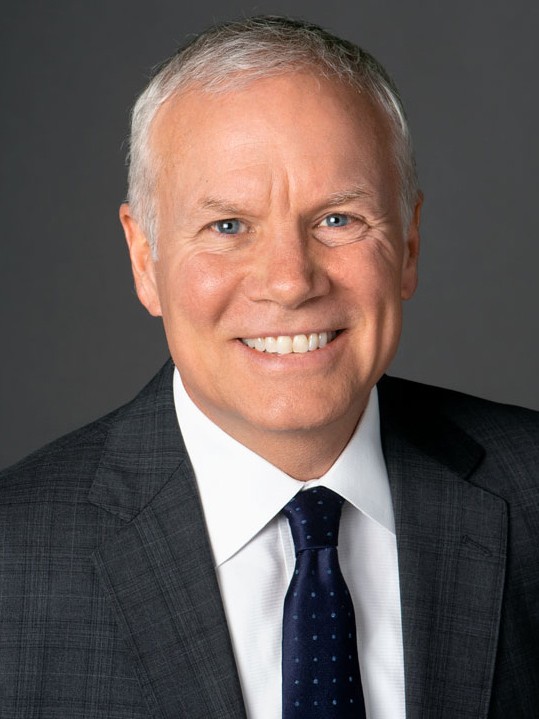Douglas Lankler, J.D. '90, executive vice president and general counsel at Pfizer, has played a leading role in establishing Pfizer's agreement with the U.S. Department of Health and Human Services and Department of Defense for large-scale production and nationwide delivery of 100 million doses of a COVID-19 vaccine. The U.S. began administering the Pfizer-BioNTech vaccine Dec. 14.
We ask Lankler what it has been like to head the legal team at the world's largest pharmaceutical company during this extraordinary time.
How did Pfizer deal with the intense public and political pressure to develop a vaccine?
The strong sense at Pfizer, and I think throughout the pharmaceutical industry, is that this is a moment where it is both a privilege to have developed a vaccine as well as a duty because that's what our industry is here for. This is what we're supposed to do and we're playing a role in developing a solution. As a general matter, I think Pfizer is a hard-working and hard-driving organization, but the level of effort here is unprecedented.
Pfizer's agreement with the federal government calls for it to produce and deliver 100 million doses of a COVID-19 vaccine. How is Pfizer working to meet this ambitious goal?
There was a lot of effort early on in our industry to cultivate cross-collaborations among scientists, across companies - a genuine effort to figure out what are we going to do and how are we going to solve the problem. That started to turn into partnerships in which different companies partnered with biotechs and other organizations or manufacturers. We were fortunate that we already had a collaboration with a great company called BioNTech that focused in on influenza. They quickly identified a few different potential compounds that seemed to be promising.
I'm fortunate to have a really strong team here that's been working very closely with government agencies. The Food and Drug Administration in particular has been tremendously helpful. They've gone to great lengths to work with the pharmaceutical industry to ensure we deliver what everybody wants, which is not just an efficacious vaccine, but one that has demonstrated safety and one that meets the normal expectations and standards of any vaccine. That's been the critical piece. It's just been a lot of collaboration.
What unique challenges from a legal perspective arose during this effort?
Let's just say that phrases like "Defense Production Act" weren't exactly the type of thing you heard or focused on before March. I've been at Pfizer for 21 years and I've been general counsel for the last seven. Literally a day has not passed since March where some new issue doesn't come up that you've never dealt with before and you have no playbook to direct how you're going to manage your way through it. Yet, somehow by the end of the day, you've done it.
Early on we dealt with antitrust concerns around making sure that all the scientists across the industry could meet and solve problems without worrying that somebody down the line would raise objections. In addition, there is a host of new contracting considerations that are radically different that we've had to work our way through.
The Pfizer-BioNTech COVID-19 vaccine is stored in freezers that keep them extremely cold: minus 70 degrees Celsius, which is colder than winter in Antarctica.
How has Pfizer been rallying employees to meet this incredible task?
Albert Bourla, who is a relatively new CEO although he's been at the company for more than 20 years, declared from the outset, "I want us to be part of the solution and I expect that we are going to be part of the solution." Albert's directive was clear: "I don't want to hear 'can't.' I don't want to hear 'impossible.' Just make it happen." It was inspiring and it helped morale tremendously to have that tone from the top. Albert has always wanted us to deliver a safe and effective vaccine.
The U.S. began administering the Pfizer-BioNTech COVID-19 vaccine, shown here being inspected in Pfizer's facility in Kalamazoo, Michigan, on Dec. 14.
What are some management challenges you and your legal team have faced since the pandemic arrived?
Everyone in the legal division has been working from home and we've found that we're very productive and it works. Unfortunately, in some cases, it has worked too well. The productivity is very high, but now the workday has no boundaries and there is no beginning, middle or end.
So, we've got to figure out the boundary thing. I can tell our folks are busting at the seams and I'm sure that's true at other companies. That's not sustainable. People can dig in and hunker down as they are getting through crises and driving toward solutions that are so important to society, but eventually, people are going to get burned out. Figuring this out is going to be a big focus for us.
When we do go back to the office, it feels like some amount of working from home is here to stay. What we are trying to determine is whether that is going to be a certain number of days per week or particular weeks per month so we can interact face to face and benefit from that. I miss that tremendously.
This article is adapted from "Douglas Lankler: Helping the Vaccine Development Process" by Chris Brouwer, editorial director at Cornell Law School.









